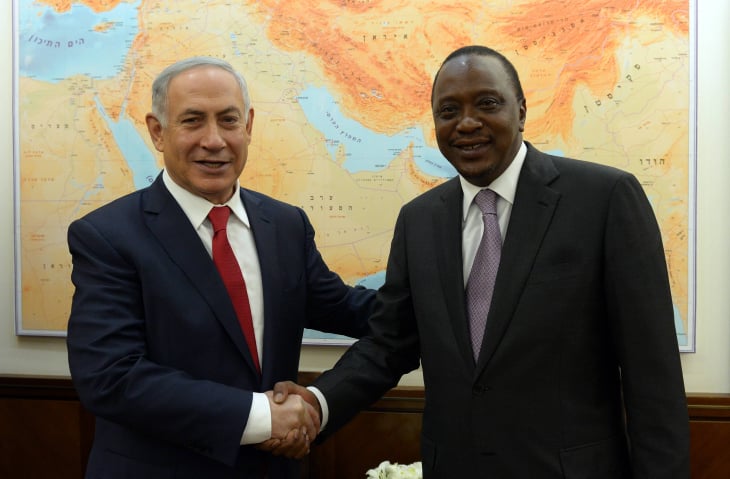Israel is hoping that a visit by Israeli Prime Minister Benjamin Netanyahu to Africa — the first by an Israeli premier in three decades — will usher in a new era in which it provides African states with security and agricultural assistance in return for support in international forums.
Prime Minister Benjamin Netanyahu heads to Africa this week, where Israel has found much-needed partners in the battle against Islamic militants and allies in countering the rising Palestinian influence at the United Nations.
Netanyahu will also visit the site where his brother was killed in a 1976 military raid on a hijacked airliner in Uganda, a seminal event that helped cement his hard-line ideology.
Israel has a long history of involvement in Africa, sending experts in agriculture and development, as well as military advisers and mercenaries, over the years.
Netanyahu’s visit caps a budding rapprochement in recent years initiated by Defense Minister Avigdor Liberman, who, as foreign minister a few years ago, toured the continent on two occasions after no Israeli foreign minister had visited in two decades.
In turn, dozens of African dignitaries have visited Israel in recent years, including Kenyan President Uhuru Kenyatta and Liberian President Ellen Johnson Sirleaf. Dore Gold, a senior Israeli diplomat, traveled to South Africa in March, hoping to mend ties with a country that is strongly supportive of the Palestinian quest for statehood.
“Israel is coming back to Africa; Africa is coming back to Israel. It’s happening in a big way,” Netanyahu told African ambassadors at the launch February of the Israeli parliament’s caucus for Israel-Africa relations. Netanyahu said last month he will seek government approval for a $13 million plan to strengthen economic ties and cooperation with African countries.
Israel played a prominent role in assisting newly independent African countries in the 1960s, but those relations crumbled in the 1970s, when Arab countries, promising aid, pressured African nations to limit or cut ties with Israel. African states were also opposed to Israel’s close ties to South Africa’s apartheid government.
With the rise of jihadism across the continent, from Boko Haram in Nigeria to al-Qaida-linked al-Shabab militants in Somalia, Israel has found common ground with countries like Kenya, Uganda and Nigeria.
“Any victory of radical Islam in any part of Africa immediately impacts us,” said Avi Granot, the former head of the Israeli Foreign Ministry’s Africa division. “The more defeats (militants) face, whether it is in Nigeria, Cameroon, Somalia or Chad, then it’s a victory also for the Middle East.”
While Israeli military exports to Africa are limited, it provides several countries with security training and assistance. Granot cited Israel’s deployment of a team of security experts following the 2013 al-Shabab attack on a Nairobi mall. He said Israel, with its vast experience fighting militants, could continue to offer training on terror prevention.
Israeli defense officials say intelligence sharing is limited to a few close allies for now. Israel has military ties with several African countries, and Israel’s Defense Ministry has given clearance for private Israeli security firms to operate in some nations, including some arms sales.
In exchange for its expertise in security and other fields, Israel wants African states to side with it at the U.N., where the General Assembly overwhelmingly recognized Palestine as a nonmember observer state in 2012. The Palestinians have used their upgraded status to launch a diplomatic offensive against Israel and its occupation of lands where the Palestinians hope to establish a future state.
“We’re talking about some 45 countries in sub-Saharan Africa who vote in one bloc at the U.N.,” said Arye Oded, a former Israeli diplomat and expert on Africa. “Netanyahu wants to improve relations with these countries … and wants more countries to not vote against us at the U.N.”
Granot said African countries may be responsive to supporting Israel because the Palestinian cause is “tangential” to them. One example of that came during Kenyatta’s trip, when he angered the Palestinians by visiting a Jewish settlement in the West Bank. The Palestinians and virtually the entire international community view the settlements as illegal or illegitimate.
Yoram Elron, the head of the Israeli foreign ministry’s Africa division, said an increasing number of African countries “understand that Israel is being singled out in the international fora.”
Jamal Dajani, the Palestinian government spokesman, said he believed African states would see through Netanyahu’s “propaganda” because Africans and the Palestinians share a history of “occupations and colonialism.”
Netanyahu departs Monday, and will spend a total of four days in the east African nations of Uganda, Kenya, Rwanda and Ethiopia.
In Uganda, a ceremony is planned to mark the 40th anniversary of the July 1976 operation that freed Israeli hostages from a hijacked plane at Entebbe. Netanyahu’s brother Yonatan, the leader of the commando unit that led the raid, was shot dead as he was helping the Israeli hostages who had been held inside the airport’s old terminal back onto the plane. His death made Yonatan an Israeli hero, and thrust Netanyahu toward public life.
“It changed his life 180 degrees,” said Nahum Barnea, Israel’s pre-eminent political columnist, adding that Netanyahu has also derived political capital from his brother’s death.
“The images from the airport will make Israelis think that Yoni and Bibi are the same thing,” he said, referring to the Netanyahu brothers by their nicknames. “The outcome will be (the impression that) Netanyahu is linked to victory. Netanyahu is linked to military success.”
By: Tia Goldenberg, AP
Do You Love Israel? Make a Donation - Show Your Support!
Donate to vital charities that help protect Israeli citizens and inspire millions around the world to support Israel too!
Now more than ever, Israel needs your help to fight and win the war -- including on the battlefield of public opinion.
Antisemitism, anti-Israel bias and boycotts are out of control. Israel's enemies are inciting terror and violence against innocent Israelis and Jews around the world. Help us fight back!
